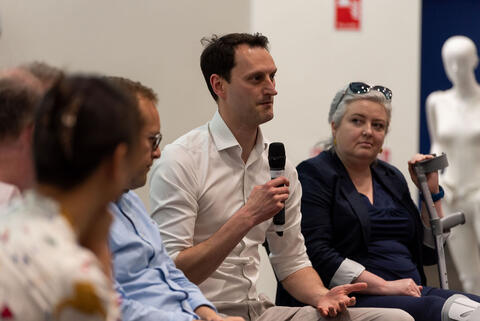Published
AI for Society: Problem or Solution?
Social Impact Day, hosted by Imperial Business School, brought together academics, entrepreneurs, students and industry experts to explore and celebrate how to achieve tangible social impact and improve lives around the world through business, enterprise and work.
The event was organised by the Gandhi Centre for Inclusive Innovation, based at Imperial Business School and hosted by co-Directors of the Centre Professor Sankalp Chaturvedi, Professor of Organisational Behaviour & Leadership and Dr Sven Mikolon, Associate Professor of Marketing. The theme of this year’s event was the impact of Artificial Intelligence on Society.
Ideas to Impact Challenge 2023
The event explored how entrepreneurship can have positive social impact and address global problems, challenging students to come up with innovative new business pitches in the Ideas to Impact Challenge.
Six teams of student entrepreneurs had the opportunity to pitch their ideas to our panel of industry experts, demonstrating how they plan to solve some of the world’s biggest challenges and impact a million lives, with the top three teams receiving start-up funds and continuous coaching, mentoring and business support from experts at Imperial.
Claiming the top prize of £7,000 was ‘upLYFT’, who are providing therapeutic rehabilitation via a wearable device. Their device supports flexibility, allowing the user to multitask and carry on with their day whilst simultaneously receiving therapy. Users are now able to meet with friends, family or go for a walk whilst receiving this therapy, promoting patient freedom. ‘upLYFT’ was founded by Aalok Rai and Zuzanna Kosobudzka, helped by Rajlakshmi Chavan, Matthieu Pallud, Indumita Prakash, and Cassie Henderson - a team collaborating across multiple institutions, including Imperial College London, University College London and the Royal College of Arts.
Second prize of £5,000 went to ‘Resolut’, a platform designed for individual investors to engage on SDG-aligned opportunities with the companies they are invested in. The team is made up of Imperial College postgraduates Frederick Fabian, Freddie Stretch, and Jude Otaibi.
Awarded with £3,000 of seed funding in third place was ‘Innogen’, who are revolutionising the treatment of ED with an 'all in one' patented design, reducing cost, contamination & side effects. Innogen is the product of another inter-university collaboration, founded by Yi-Hsuan Ko, Ching-Hao Chen, Krishana Agarwal, Yu-Chieh Lai, amy, Ping-Chen Lin, and Chang-Chuan Chen, students from Imperial College London, University College London, and London School of Economics.
The other teams to take part in the Ideas to Impact Challenge were:
- miPanScan– with a safe and cost-effective biosensor for early stage cancer detection
- Innowave– providing a sustainable and renewable source of energy through the use of wave energy converters
- Strata – a low cost, solar driven system for autoclaving and medical sterilization in remote & resource-limited areas
Expert panel
At the event, a panel of experts discussed the opportunities and dangers of fully developing Artificial Intelligence and how useful they are currently, and potentially, in various industries.
Discussing the balance of power and beneficial effect of growth, moderated by Gandhi Centre Honorary Practice Fellow Simone Koo Ishikawa were Tom Graham, Managing Director at Accenture, Dr Catherine Mulligan, Fellow at the World Economic Forum and Visiting Lecturer at Imperial Business School, David Farquharson, Founder of London Law Collective, and Sebastian Drave, Head of Customer Solution and Innovation at Harbr.
AI to improve society
During some final thoughts, Dean Francisco Veloso discussed the value of research, recognising real-world impact and diversity in technology, and how this can help us to spot opportunities to make tangible improvements to society, now and in the future.
He finished by urging us to consider "*How* we improve a million lives?", and how we can really make those big changes, not just in education, but across the board.


